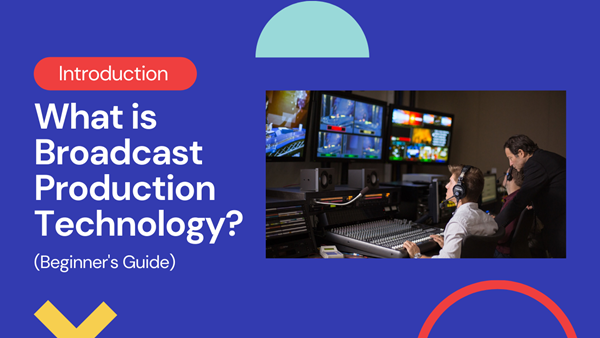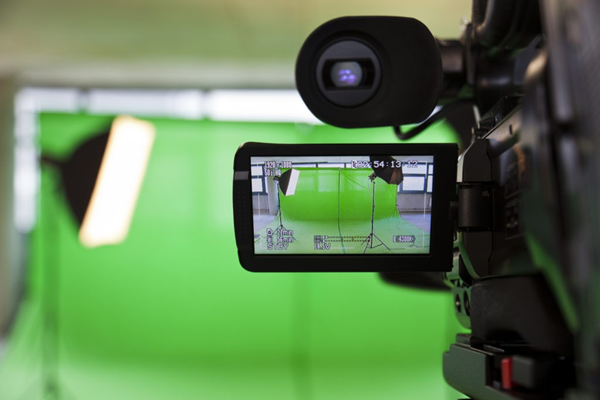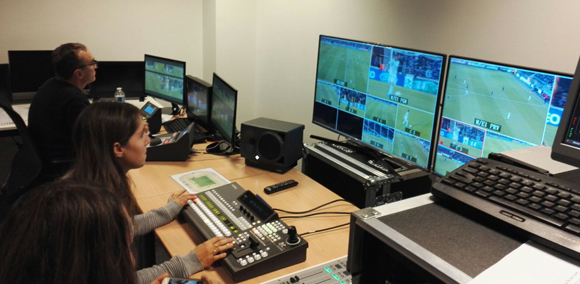|
Broadcast production technology is known as a program that focuses on audio and video editing, broadcast writing, broadcast production and performance, video production and performance, live production, post-production, and modern media delivery methods.
During the course, students learn
- During the course, students learn
- During the course, students learn
- During the course, students learn
During the course, students learnDuring the course, students learnDuring the course, students learnDuring the course, students learn
|
 |
What is Broadcast Production Technology?
Broadcast production technology is known as a program that focuses on audio and video editing, broadcast writing, broadcast production and performance, video production and performance, live production, post-production, and modern media delivery methods.
During the course, students learn the basic knowledge of broadcasting through practical experience. Students will use the latest software with modern studio audio/video equipment to create and edit audio and video works. Students will gain experience in contemporary studio operations and script and radio writing skills, media performance, radio/media history, methodology, sales, and ethics.

The broadcast and production technology course prepares students to serve as announcers, music directors, journalists, promotion and sales representatives, station managers, broadcast editors, camera operators, live audio engineers, associate producers, control engineers, production managers, live directors, multi-media producers, effect operations and other broadcast technicians.
Types of TV Productions
Starting out in the TV production industry is a tough job in itself, with fierce competition, and they tend to favor only the best and most connected. Television production jobs offer many opportunities for aspiring young people, and the breadth of these TV jobs is remarkable, from reality TV to online digital TV broadcasting.
Live TV production is just what it sounds like - live. It's like watching a play. All errors are "played" and you can't go back and edit what's already on the air.
Live shows are running out, but sporting events, most news shows, and some awards ceremonies are broadcast live.
1. Live TV Production
Live-to-Tape TV production is like a live broadcast, but it is pre-recorded. Most errors are "on the air", but if something major goes wrong during recording, there may be time to reshoot clips or make minor edits.
These include breaking news, live concerts, live speeches, and more. Live TV offers more stressful, more specific jobs.

There's no room for error in live TV, and your roles can range from the producer, director, or cameraman to cable operator, lighting engineer, audio technician, and more. Live TV broadcasts are often unpredictable, so you should be ready at any time of the day or night. Sometimes your times are long, but sometimes they are short. You may need to travel.
Talk shows are the most popular form of live broadcast production. It allows for some small changes and pre-promotion of the program.
2. Pre-made TV productions
Pre-production TV productions are pre-recorded and edited, just like film productions. All mistakes can be corrected before the show is "on the air". These shows are often heavily edited and can use a variety of settings.
TV shows are the most popular form of preproduction. It allows time to polish the show before it airs.
3. TV Show
For entertainment value, television networks and channels provide regular programming including television shows and series to the public. Shows can be of any genre, including comedy, drama, action, thriller, and documentaries. Typically 30 or 60 minutes in length, these TV shows will provide TV work in acting, directing, writing, lighting, makeup, costumes, set design and construction, production management, and more. Your day is usually 12 hours and you work 3 to 5 days a week.
4. Reality TV Show
Along the lines of documentaries, reality TV is the latest television phenomenon to sweep the globe. Every week, viewers tune in to watch a group of girls fights to win the hearts of handsome millionaires or take part in grueling challenges to earn immunity and a million-dollar punch. You should be prepared for long trips and have the potential for a lot of travel.
5. TV Advertisement
To make up for the huge costs involved in the TV production industry, TV commercials are used to create international exposure for sponsors. TV commercials are produced with the help of production and advertising teams, and other important TV production jobs in the industry include TV production crews, actors and extras, special effects teams, and post-editing. Your day should last about 12 hours, and you must be prepared for day or night shooting.
6. Online TV
As the world gets smaller, you have a unique opportunity to get involved in online TV work, Internet TV channels offer broadcasts on all your favorite topics, even news podcasts, travel podcasts, and the latest web drama craze, which is broadcast on the web A regular episode of a fictional TV show. Online TV offers great success for all industry professionals as anyone can start a TV channel online. You can do whatever you like to make sure your show is successfully uploaded to the Internet, whether on your own website or on video-sharing sites like YouTube.